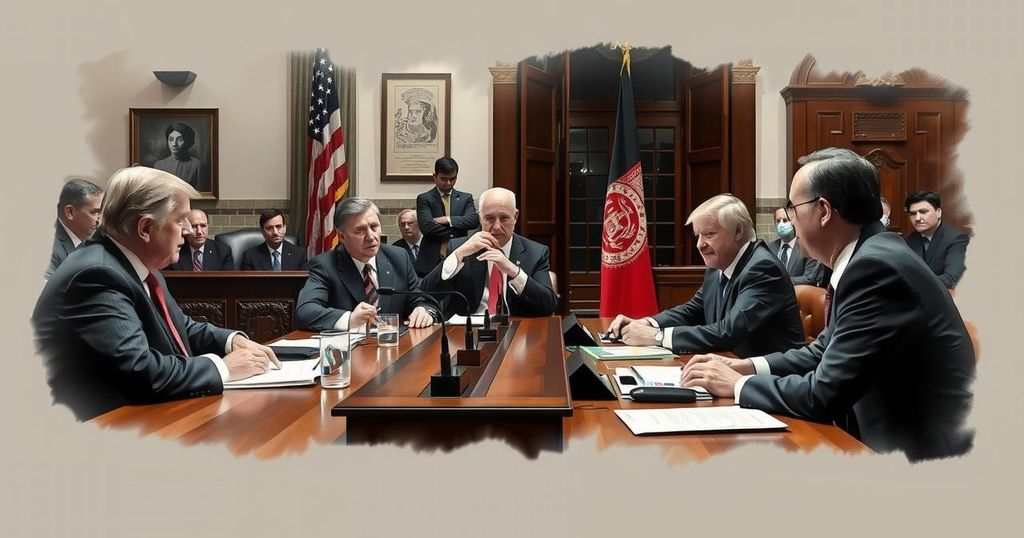World news
” MCCAUL, AFGHANISTAN, AMERICA, AP, ASIA, BIDEN, BLINKEN, CONGRESS, DEMOCRATIC NATIONAL CONVENTION, ELECTION, FAR, HOUSE FOREIGN AFFAIRS COMMITTEE, HOUSE REPUBLICANS, JOE BIDEN, PRESIDENTIAL CAMPAIGN, PRESIDENTIAL DEBATE, TALIBAN, TEXAS, U. S, U.S. ELECTIONS, U.S. PRESIDENCY
Lena Nguyen
0 Comments
Blinken Confronts Congressional Criticism Over Afghanistan Withdrawal
Secretary of State Antony Blinken testified before Congress regarding the U.S. withdrawal from Afghanistan, facing criticism from Republicans who attributed the chaotic exit to Biden’s policies. During his testimony, he defended the administration’s actions as a necessary outcome of previously negotiated agreements with the Taliban. The broader narrative points to systemic failures across multiple administrations, suggesting shared accountability for the repercussions of the withdrawal.
On Wednesday, Secretary of State Antony Blinken appeared before the House Foreign Affairs Committee, confronting intense scrutiny regarding the U.S. withdrawal from Afghanistan, a pivotal event during President Joe Biden’s administration. Texas Republican Michael McCaul criticized the withdrawal, stating it marked the beginning of a foreign policy failure that destabilized global security. Blinken commenced his testimony by expressing condolences to families of U.S. service members who had died during the evacuation, amidst protests from the audience.
In defense of the administration’s actions, Blinken attributed the chaotic withdrawal to the agreement negotiated by the previous administration under President Trump with the Taliban. He articulated that the choice presented to President Biden was either to conclude the war or to escalate military involvement, emphasizing that failing to honor the prior agreement would have reignited violence against U.S. forces and allies. Blinken’s testimony follows a critical report from House Republicans, attributing the withdrawal’s failure primarily to the Biden administration while marginalizing Trump’s part in the negotiated deal.
Despite the Republican committee’s findings that detailed operational failures leading to the Taliban’s rapid takeover of Afghanistan, analyses suggest a broader systemic failure across the last four presidential terms. This evidence indicates that both former President Trump and President Biden merit significant accountability for the outcome of the withdrawal, which culminated on August 30, 2021, and left many vulnerable individuals behind.
The U.S. withdrawal from Afghanistan, completed in August 2021, has been a subject of extensive scrutiny and debate, particularly given its chaotic nature and the swift takeover by the Taliban. After nearly two decades of military involvement, the decision to withdraw ultimately fell to President Joe Biden, following an agreement initiated by the Trump administration with the Taliban in February 2020. This transition prompted bipartisan criticism, with various investigations aimed at determining accountability and evaluating the strategic failures that led to the disastrous implementation of the withdrawal. The political fallout from this event continues to resonate, with congressional hearings providing a platform for opposing parties to express their perspectives on the implications of the withdrawal on both national and international security. The testimonies and reports generated as a result of these hearings serve to illuminate the complexities surrounding the U.S. foreign policy framework and the consequences of unilateral military decisions.
In conclusion, Secretary Antony Blinken’s testimony before the House Foreign Affairs Committee underscores the contentious and complex narrative surrounding the U.S. withdrawal from Afghanistan. Republican criticisms reveal deep partisan divides regarding accountability for the crisis. Ultimately, while Blinken defended the administration’s actions as a necessary follow-through on prior commitments, analyses indicate that both the Biden and Trump administrations share culpability for the events that transpired, highlighting systemic failures that extend beyond any one administration.
Original Source: www.news-herald.com




Post Comment